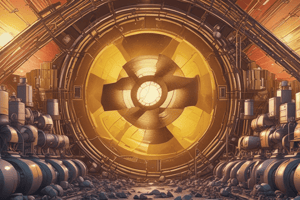Podcast
Questions and Answers
Where is nuclear waste almost always stored?
Where is nuclear waste almost always stored?
- In landfills
- In the ocean
- In pools of water or dry casks on-site (correct)
- In deep geological disposal
What is the best option for long-term storage of high-level nuclear waste?
What is the best option for long-term storage of high-level nuclear waste?
- Storing it in pools of water
- Dumping it in the ocean
- Deep geological disposal (correct)
- Burying it in landfills
What is the most concerning type of nuclear waste?
What is the most concerning type of nuclear waste?
- All types of nuclear waste are equally concerning
- Intermediate-level nuclear waste
- Low-level nuclear waste
- High-level nuclear waste (correct)
What is nuclear waste and where does it come from?
What is nuclear waste and where does it come from?
What is the best way to store high-level nuclear waste?
What is the best way to store high-level nuclear waste?
Is nuclear waste more or less harmful than fossil fuel waste?
Is nuclear waste more or less harmful than fossil fuel waste?
Flashcards are hidden until you start studying
Study Notes
The Truth About Nuclear Waste: Misconceptions and Solutions
- Nuclear waste emits alpha, beta, or gamma radiation and can come from nuclear medicine, power production, reprocessing of nuclear weapons, and rare earth mining.
- Almost half a million tons of nuclear waste have been generated, but only a third has been recycled due to public skepticism.
- Nuclear waste is almost always stored on-site where it is generated, either in pools of water or in dry casks above ground.
- Properly managed nuclear waste has no currently known widespread environmental or public health effects and is not the toxic, glowing green goo portrayed in media.
- Fossil fuel waste, on the other hand, is much worse for the environment and public health, with coal plants alone emitting more ash than all nuclear waste ever produced in every single way.
- High-level nuclear waste, the most concerning type, only makes up a tiny fraction of all nuclear waste produced and can be stored in dry casks made of concrete, steel, glass, and ceramic.
- Nuclear waste transport casks are nearly indestructible and have traveled millions of miles with zero recorded accidents where one cracks open and leaks.
- The best option for long-term storage of high-level nuclear waste is deep geological disposal, which has been proven to work through natural nuclear reactors that occurred billions of years ago.
- Deep geological disposal involves digging a big hole that goes really far underground, putting the dry casks in there, and sealing it with concrete, isolating it from humanity.
- Deep Isolation, a private company, has proposed using borehole technology to store nuclear waste, which takes up less space and is more cost-effective than traditional deep disposal methods.
- Funding and proven technologies exist for safe and manageable nuclear waste storage, but public acceptance is needed to move forward.
- Nuclear power can be expanded and used to fight climate change if nuclear waste is properly managed and stored, and misconceptions are dispelled through accurate education.
The Truth About Nuclear Waste: Misconceptions and Solutions
- Nuclear waste emits alpha, beta, or gamma radiation and can come from nuclear medicine, power production, reprocessing of nuclear weapons, and rare earth mining.
- Almost half a million tons of nuclear waste have been generated, but only a third has been recycled due to public skepticism.
- Nuclear waste is almost always stored on-site where it is generated, either in pools of water or in dry casks above ground.
- Properly managed nuclear waste has no currently known widespread environmental or public health effects and is not the toxic, glowing green goo portrayed in media.
- Fossil fuel waste, on the other hand, is much worse for the environment and public health, with coal plants alone emitting more ash than all nuclear waste ever produced in every single way.
- High-level nuclear waste, the most concerning type, only makes up a tiny fraction of all nuclear waste produced and can be stored in dry casks made of concrete, steel, glass, and ceramic.
- Nuclear waste transport casks are nearly indestructible and have traveled millions of miles with zero recorded accidents where one cracks open and leaks.
- The best option for long-term storage of high-level nuclear waste is deep geological disposal, which has been proven to work through natural nuclear reactors that occurred billions of years ago.
- Deep geological disposal involves digging a big hole that goes really far underground, putting the dry casks in there, and sealing it with concrete, isolating it from humanity.
- Deep Isolation, a private company, has proposed using borehole technology to store nuclear waste, which takes up less space and is more cost-effective than traditional deep disposal methods.
- Funding and proven technologies exist for safe and manageable nuclear waste storage, but public acceptance is needed to move forward.
- Nuclear power can be expanded and used to fight climate change if nuclear waste is properly managed and stored, and misconceptions are dispelled through accurate education.
Studying That Suits You
Use AI to generate personalized quizzes and flashcards to suit your learning preferences.




